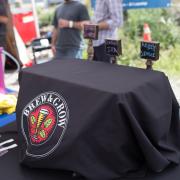I didn't really ever think I'd say this but Friday was the first time I felt brewing was a huge waste of time; most unrewarding 7 hours I've spent in a long time.
When I want to brew something kinda-sorta to style and don't really care about numbers, I'm fine (after all, it's what I do in the kitchen: put something on a corn tortilla and it's something of a taco; lettuce and some veggies thrown in a bowl is some kind of salad).
When it comes to brewing something specific, however - Friday was the third beer I brewed for a barrel - I don't get what I want. It's this (and the fact that I can't figure out where I'm going wrong) that makes seven hours spent brewing a complete and utter waste of time. I've probably brewed 15-20 batches (most of those all-grain) and only once have I come close (BeerSmith said OG should be 1.079 and I think I got 1.076) but I have never hit right on and always low; going over is never going to happen as long as I brew.
I suppose what pushed me over the edge on Friday is that I thought I was doing everything right, more correctly than I had previously (e.g., sometimes I can't quite figure out strike temp and I get a mash temp a degree or two above what I wanted but not so this time) and the fact that I heard others got HIGHER than the estimated OG and I didn't come anywhere close (OG was supposed to be 1.129 and I got 1.097).
All that is to say, if you haven't gathered already, I'm pretty discouraged and frustrated. Why would I spend 7 hours and three weeks on a beer of my own whose specific characteristics/ABV I only guess at when I can walk down the block to say, Revolution, and in 20 minutes get some awesome beer whose characteristics/ABV is certain...
Any suggestions/tips?











Nice. Thanks for all this. I felt stuck before since I didn't know what to tweak/change; now I know something to tweak/change.
If your volumes were mostly close, then the pre-boil gravity reading was not accurate, which could have been caused by not sufficiently stirring the wort once it was all in the kettle, and thus getting a reading off of a portion of the wort that was stronger than the wort, as a whole actually was. It's also possible that the refractometer might have been miscalibrated for the temperature of the wort.
If it was the case that your pre-boil gravity was lower than it should have been, then your issue is doing a better job of extracting the sugars from, and rinsing them off, your malt once everything is in the mash tun. In this case, it sounds to me like it was a combination of both not getting enough sugars out of your mash and not boiling your volume down sufficiently* to hit your numbers.
-Adam
* Of course, these two things (extracting sugars from grains and boiling them down), are basically the entirety of all-grain brewing, so I've really given you no new information other than "you seem to have a problem in your brew process." Which is what this whole thread is about... :-)
There's already an old laptop there with BeerSmith loaded on it. Only problem is - as odd as it may sound - there's only one electrical outlet it works on (the one under the hotbox/behind the shelves). Plugged into any other outlet in the brew house and the computer gives you an error message something to the effect of, "Battery does not have enough power to power the docking station attached to this computer." I was banging my head against the wall at one point because I kept plugging it into different outlets and literally screaming at the computer, "It's not connected to any docking station!!!!!!!!"
I really, really appreciate all this info, guys. I like the science/numbers behind the brewing but, sounds like James' method of modifying in-fermenter is a bit easier.
Aha! Nice. I like that kinda stuff.
If I didn't have 9 to start, it was pretty darn close; if I had more than 6 gallons, again, it wasn't by much (it all fit in a 6 gallon carboy, at least, with little room to spare if that's any indication). So, maybe what I could have done was boil an extra 1/2 gallon off? Could that have been the major glitch in my process on this batch?
There are tools in beersmith for this, the"boil off" tool. Maybe we should get an old computer for the brewhouse and load beersmith onto it. I always bring my laptop but it would be nice not to.
And while I do meticulously keep tabs on where my gravities are at during the process with a refractometer, and adjust as I go with DME or water, I have found it is much easier and less stressful to modify in the fermenter.
If I am 1-3 points off I dont do anyting
4-10 points off I add corn sugar
10+ DME and corn sugar
I moved to modifying in the fermenter mainly because I kept getting inconsistent measurements on my gravity or my modifications would produce unexpected results. It seemed that I was causing more harm than good during the boil and really stressing out. I have also been adding corn sugar strait to the fermenter for some time now in my imperial IPAs and other high gravity beers. I get much better attenuation if I add as much as 15% corn sugar to the ferementer after fermentation starts to slow.
So, the back of the envelope math that I used is:
Beg Volume * Beg Gravity = End Volume * End Gravity
The numbers you fill in for the gravity portions are the gravity points, e.g., 1.075 is 75 gravity points.
Based on this back-of-the-envelope math and your pre-boil gravity reading, you should have ended up with 5.5 gallons at 1.122, or slightly better than 70% efficiency. So, you either didn't have a full 9 gallons in your pot when you started the boil, your pre-boil reading was high, or you ended up with more than 6 gallons into the fermenter.
-Adam
So, this is the sort of thing I'm interested in: what was your "back of the envelope math"? I think I have the basic, overall, process down but I'm very interested in the more precise details, maybe the ones I can change/tweak on the fly (e.g., knowing I have 9 gallons in the pot at 1.075, how much do I need to boil off - even if it's 7.5 gallons - to reach a certain OG).
To answer your questions: preboil grav was 1.075; I didn't even plug it into BeerSmith since Daniel had the recipe, directions, and info written out already.
You might not be as far off as you think, Jim. The OG for Daniel's Bourbon county recipe (as posted in the thread) was calculated at something like 80% efficiency, which is really hard to do (almost impossible) for such a big beer. When I input the recipe into Beersmith and calculated it at 70%, it came out to an estimated 1.119 for 5.5 gallons into the fermenter. So, IMO, 1.119 is a much more reasonable baseline. Moreover, you got 6 gallons into your fermenter instead of 5.5. Doing some quick, back of the envelope math, had you boiled it down further to 5.5 gallons, you would have been closer to 1.107 or so. Of course, my math may be very wrong here, as I generally rely on Beersmith for these sorts of things. You probably ended up with efficiency in the range of 60%, which, for a big beer, is not really all that bad. Of course, we should always be looking for ways to improve, but you shouldn't be too hard on yourself for this one.
As far as what happened here, it appears that you didn't extract enough sugars from the grains, either because of incomplete conversion (unlikely), or because of difficulty in getting all of those sugars out of the mash (probably). Did you take a pre-boil gravity reading? Did it match up to what Beersmith said your pre-boil gravity should be?
-Adam
I can definitely answer all those questions:
Where did I go wrong?
In my experience doing the stupid amount of high gravity batches that I did in the winter, I found that decreasing my mash ratio from 2 or more quarts per lb down to 1 quart per lb has helped me out significantly. I got this advice from Dave as he always gets better numbers than me. He goes lower than 1 quart sometimes.
Can you give the following information? This is the stuff that matters for the gravity, as I think I noted in the BC thread.
What's your ratio of water to grain?
How much did you sparge?
What was your preboil volume?
How much wort did you end up with?
How long did you boil?
What did you boil off?
What was your mash temp?
What was your sparge technique?
Excellent. Thank you for taking the time to answer and to pass along all those links. I will definitely check them out.
Jim,
You ask the eternal questions about brewing. The single most important thing is to choose a method (mash time/grist ratio/sparge method and timing) and do it every time. I can speak to some of your questions with a fair degree of confidence:
Mash temp should vary based on style. If you brew a ton of different styles it will be hard to dial in efficiency as it will change for the different types of beer. A couple rules of thumb that I am sure you have heard before. 146-148 for crisp easy drinking beers. 152 for ales, 156 for full bodied beers. I break all these rules of thumb when I feel I need to, they are not handed down from God by any means. To really understand why, you need to do a lot of reading on enzymes and listen to this:
http://thebrewingnetwork.com/shows/Brew-Strong/Brew-Strong-10-13-08-Enzymes
You can try mashing longer, see if that helps, it might. Stir from time to time.
Do you batch or fly sparge? When I was batch sparging in a cooler I managed to get my system fairly consistent. My new RIMs setup (direct fire mash with pump) I am getting all sorts of problems with efficiency I have not figured out yet. However the beer I am getting out I feel really good about.
What efficiency are you shooting for? I only look to get 70%, I think (this is an opinion not based on any facts) getting a much higher efficiency leads to worse tasting beer. I think it extracts tannins and leads to astringency.
http://thebrewingnetwork.com/shows/564
As far as grist raito I have no reliable advice. What I understand is the the range is huge 1-4qt/lb. I dont know how much it matters and I have not found a good source of information on it. 1.33 seems to be the homebrewer standard. I used that when I was in the cooler. Having a pump I go thinner 1.5, but I am thinking of moving up to 2
http://www.byo.com/stories/techniques/article/indices/45-mashing/1115-managing-mash-thickness.
Optimal boil off is somewhere between 12-15%, you can plug that into beersmith. Its in the equipment settings. I think I do around 1.5g/hr.
http://thebrewingnetwork.com/shows/600
Water chemistry also plays a significant role, if you are not calculating your water use the 5.2 stuff. Learning basic water chemistry takes time, but it is worth it.
http://thebrewingnetwork.com/shows/497
http://www.youtube.com/watch?v=zJj__jEkFUE
The reality is (unless you are a brewing savant) that this information takes time to learn and figure out how to apply. Just keep at it.
Thanks for all this; very, very helpful! I felt that I was at an impasse, I didn't know what to tweak or what to ask. Everything you say, James, raises more questions which is good! Something to go on!
So, I do indeed brew with the same equipment each time: brew house grain mill (used to be the old one now I use the new one; probably 4-5 batches on each mill), my tun, Niilo's natural-gas-converted Bayou burner, and I always use my pot. I know that with a very vigorous boil on this setup I get rid of two gallons per hour (I shoot for 8 gallons of wort into the pot; vigorous boil; right around 6 going into the fermenter). But, what is an optimal rate of boil off?
And, furthermore, given that I'm on the same system every time, what more specific things should I be tweaking? e.g., Should I be mashing with .8-1 qt/lb and then sparging more? The exact opposite? Higher mash temp? Lower mash temp? Should I be mashing longer? Shorter?
Yeah, you did the bourbon county clone. the numbers on that are terribly difficult to hit, you should not be at all surprised or disappointed that you were significantly lower than target. The only reason I cam close on that patch was because I significantly lengthened my both time and got under 5g total. Getting a decent efficiency from such a high gravity beer is near impossible. I think I had a mash efficiency on that beer of around 45-50% (I was targeting 60%) For me It was also one of my most frustrating brew days ever. I will totally support using your batch in the barrel if all that is off is the gravity.
Efficiency is a really difficult thing to dial in. I am on batch 90 and I still miss fairly often. It requires brewing on one set of equipment (same mash tun, grain mill and burner) and monitoring the boil throughout to make sure you are boiling off at the rate you want to be.
One big thing that I learned is to not care about hitting the numbers so much initially and modifying in fermenter. If you over shoot your gravity, dilute with water, if you undershoot your gravity add corn sugar or DME to your fermenter. I would say I do modification to 50% of my beers.
Jake,
I think we all would like to hear some of your input/ideas on increasing mash efficiency. Please share!